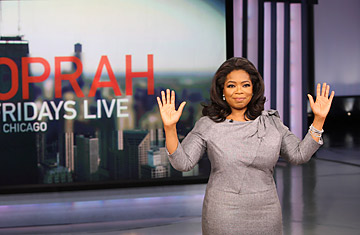
Correction Appended: Nov. 20, 2009
She's not called the queen of all media for nothing. The news that after 25 years Oprah Winfrey would be closing up shop on her afternoon talk show-cum-empire-building-exercise broke early, but she made the official announcement of the "real reason she was leaving" her way, and the way guaranteed to garner the most ratings: on her show.
"This show has been my life. And I love it enough to know when it's time to say good-bye," she said, with a tear in each eye. "Twenty-five years feels right in my bones and it feels right in my spirit. It's the perfect number — the exact right time."
Not everyone is as sure as Oprah is about the timing. For her fans, and the stations who carry her talk-fest — and certainly for book authors whose work she championed — the final air date of Sept. 9, 2011 is all too soon. But given what Oprah wants to do next, it might be too late. She's leaving network TV to focus on creating OWN: The Oprah Winfrey Network, a new cable channel that she's launching with Discovery Communications. She announced the venture almost two years ago but it will not start airing until January 2011.
The thinking behind creating her own cable property is sound. Oprah's Harpo Productions is almost as successful a creator of TV programming as she is a talk show host. Dr. Phil, Rachael Ray and Dr. Oz were all sucklings on The Oprah Winfrey Show before being launched solo into syndication. And she's not done yet: Harpo and Sony just announced that a show hosted by Nate Berkus, her interior designer of choice, will be available in 2010. "She has as good an understanding of media and how it works as anyone I've ever met," says Ken Sunshine, a media consultant who also considers her a friend. "She's very shrewd about it."
Plus, network TV is not the 800-lb gorilla it once was. Most big media companies (see Disney or News Corp.) are seeing more growth and profit in their cable operations, which have a more reliable income stream than broadcast advertising. Audiences are slipping away, and with them, high syndication fees. "Television stations have made it crystal clear that [Oprah's] show was going to get an enormous haircut if it comes back," one syndicator told trade publication Broadcasting & Cable. "Why would she want to subject herself to that when she's in such an iconic position and has a piece of OWN?"
Well, one reason is that starting a cable channel is hard. She already tried it once with Oxygen, now owned by NBC, and home to many reality shows that feature Janice Dickinson or have names that smack of ratings desperation like The Naughty Kitchen and Bad Girls Club. OWN, says Oprah, will reflect her "vision, values and interests." (Which Oxygen never quite did.)
But clearly the only way she can bring any attention of the non-Naughty Kitchen kind to the new cable channel will be if she's actually on the screen. While nobody's saying whether she'll have a talk show, Oprah has confirmed she will "appear on and participate in" programs on OWN. Instead of taking their Oprah straight up for an hour a day, it seems viewers are going to get a taste of her everywhere. Ben Silverman, the former co-chairman of NBC Entertainment and now CEO of new media firm Electus, is buying. "Her willingness to migrate to cable shows that content and brand equity travel with her," he said at an event to launch Notional, a web and TV content company. "She's betting on a future where content can live across multiple venues and transmedia."
But nobody, not even Oprah herself, knows what kind of a creature the post-network-show Oprah is. Her afternoon chat-fest occupied a unique niche: uplifting yet practical, gossipy yet worthy, it harnessed the growing commercial and social power of women over the last two decades. It was monolithic in a way that's no longer possible, even for Oprah. It was a pioneer in what is now a crowded field.
On the other hand, even Oprah isn't invincible. In the past five years, her ratings have fallen 35% — and 43% among adults 18-49. That's not a lot more than other talk shows, nor other daytime programs, but it means that she is not immune from the woes that plague lesser TV mortals. Without that big reliable pulpit in the public marketplace, how much power does Oprah wield? Does she have enough juice to convert most of her viewers to a cable channel? To develop a following for new Dr. Phils? To get Tom Cruise to jump on her couch again?
She'll be trying to conquer new territory. But can Oprah still be the queen when she no longer has a throne?
The original version of this article misstated Ben Silverman's title during his tenure at NBC.
